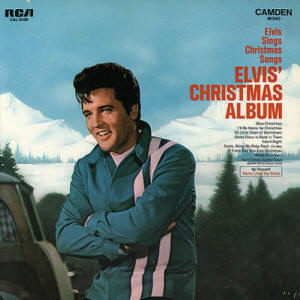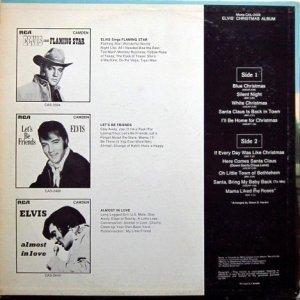

Barely four weeks after "Almost In Love"
CAMDEN released another budget lp with Presley
songs. This time it was "Elvis' Christmas
Album", which had already been advertised on the
backside of the aforementioned long player. By
the end of the year 400,000 copies were sold,
today more than 10 million Americans own this
album. The RIAA honored the sales with a Diamond
Award, which equals 10 Platinum Awards. Outside
the US "Elvis' Christmas Album" was quite
popular, too. Worldwide the lp was sold 15
million times. Translated to the present this
would be 2.25 billion streams of the complete
album or 22.5 billion paid streams of
individual tracks.
Commercially RCA Records (the parent company of
CAMDEN) hit the jackpot, because the budget
version of "Elvis' Christmas Album" didn't just
turn out to be the king's most successful album,
but also the most successful Christmas album
ever.
Since the original "Elvis Christmas Album" is
available on the streaming platforms and "Mama
Liked The Roses" as well as "If Every Day Was
Like Christmas" have been added to the digital
incarnations of "From Elvis In Memphis" and
"Elvis Sings The Wonderful World Of Christmas"
the CAMDEN edition of "Elvis' Christmas Album"
is not available on the streaming platforms.
Combined all of the king's Xmas albums (the two
original releases plus compilations) on Spotify,
which has a market share of approximately 30%
and is the only streaming service that publishes
their retrievals, mount up to 10 billion streams.
So Mr. Presley may also be called King Of
Christmas.
Once again the cover shows a photomontage of
Elvis and a snowy mountain scenery. This time
the picture of Elvis had been shot in
conjunction with the MGM movie "Speedway" in
1967. The back cover mirrored more or less the
one of "Almost In Love". Instead of "Elvis'
Christmas Album" now "Almost In Love" was
promoted and of course the track listing was
also changed.
With the eight Christmas songs of the
original album and "If Every Day Was Like
Christmas" the budget version included all Xmas
tunes Elvis had recorded to date. As a bonus it
also featured "Mama Liked The Roses", which had
nothing to do with the festive season, but had
not been available on an album before. However,
the four gospel songs "Peace In The Valley", "I
Believe", "It Is No Secret (What God Can Do)"
and "Take My Hand, Precious Lord" were not
obtainable anymore.
Blue ChristmasThe rock'n'roll king
put this one on tape within three takes on
September 5, 1957. RCA Victor released it on the
ep "Elvis Sings Christmas Songs" (1957), the
singles "Blue Christmas" / "Wooden Heart" (1964)
and "Santa Claus Is Back In Town!" / "Blue
Christmas" (1965) and the album "A Legendary
Performer - Volume 2" (1976). A live recording
is featured on the album "Elvis" (1968). The
song was written by Bill Hayes and Jay Johnson,
the first recorded version was done by Doye
O'Dell. It finally got popular by cover versions
of Ernest Tubb, Hogo Winterhalter & His
Orchestra and Russ Morgan & His Orchestra.
Silent NightThis is an adaptation of "Stille
Nacht, Heilige Nacht", a song written by Joseph
Mohr and Franz Xaver Gruber in 1818. Today this
composition is regarded to be the most famous of
its kind and was declared "world heritage" by
the UNESCO in 2011. Even though I am not
religious, this is my favorite piece of music.
No other song is so solemn, moving and beautiful
like this. Unfortunately Elvis' performance
doesn't evoke any emotions, it simply lacks
depth and feelings. In 1958 RCA Victor also used
"Silent Night" on the extended player "Christmas
With Elvis".
White Christmas
The song premiered on the first Christmas day of
1941, when Bing Crosby performed it on his radio
show "The Kraft Music Hall". On May 29th of the
following year he recorded it with the John
Scott Trotter Orchestra and The Ken Darby
Singers within 18 minutes and released it on
July 30th on the album "Songs From The Film
Holiday Inn". To Crosby "White Christmas" wasn't
anything special, but in 1942 it peaked at the
number one of the Billboard Charts and stayed
there for no less than 11 weeks. With sales of
over 50 million units it's regarded to be the
most successful single release of all time.
Countless artists have covered "White
Christmas", Elvis did it on September 6, 1957
and needed nine takes. It is said that Irving
Berlin, the writer of the song, disliked the
king's version so much, that he asked the radio
stations to boycott the recording. Even though
Berlin's reaction was ridiculous, I cannot help
to agree to his general criticism. Elvis'
version simply lacks all festiveness and
emotional depth I expect of a performance of
this song. By 1957 he simply lacked the
technique and the wealth of experience to do it
right. RCA Victor also released "White
Christmas" on the ep "Christmas With Elvis"
(1958).
Santa Claus Is Back In Town!
In this great, bluesy song Santa arrives in a
black Cadillac and it's up to the imagination of
the listener what is meant by "Hang
up your pretty stockings and turn off the light
- Santa Claus is comin' down your chimney
tonight". Obviously Jerry
Leiber and Mike Stoller completely satisfied the
wish to deliver a song suitable for the image of
the king of rock'n'roll. "Santa Claus Is Back In
Town!" was recorded on September 7, 1957 within
seven takes. RCA Victor also released the track
on the ep "Elvis Sings Christmas Songs" (1957)
and the single "Santa Claus Is Back In Town!" /
"Blue Christmas" (1965).
I'll Be Home For Christmas
Bing Crosby sang this song in 1943 and portrayed
a soldier, who promises his family to be back
home for Christmas. It turns out that it's
nothing but wishful thinking when he sings at
the end "I'll be home for Christmas, if only in
my dreams". Elvis' version, recorded on
September 7, 1957 within 15 takes, certainly is
ok, but it lacks the depth a song of this kind
requires. "I'll Be Home For Christmas" was
written by Kim Gannon and Walter Kent. To avoid
a legal dispute with Buck Ram, who had written a
song of the same title, Gannon and Kent credited
him and therefore gave him a third of their
royalties. RCA Victor also released Elvis'
recording on the ep "Elvis Sings Christmas
Songs" (1957).
If Every Day Was Like Christmas
The singer tells us about his pre-christmas
impressions and comes to realize how wonderful
this world could be if every day was like this
one. I like the song a lot, Elvis is in fine
voice, especially the chorus is great. The
rhythm track was recorded on June 10, 1966 at
the RCA Studio B in Nashville/Tennessee. Two
days later the king put his voice on the
recording and needed two takes to get it right.
The song was written by Red West and released on
a single in late 1966.
Here Comes Santa Claus (Right Down Santa
Claus Lane)Elvis recorded this nice
uptempo song on September 6, 1957 within two
takes. He really delivered a great performance,
very snappy and catchy. The first version was
recorded in 1947 by Gene Autry, who had written
"Here Comes Santa Claus (Right Down Santa Claus
Lane)" with Oakley Haldeman. RCA Victor used the
king's version also on the extended player
"Christmas With Elvis" (1958).
O Little Town Of Bethlehem
The song was written in 1868 by Phillips Brooks
and Lewis Redner and first recorded by The
Trinity Choir in 1916. Elvis did so on September
7, 1957 and needed four takes to create a
satisfactory version. He certainly sings well,
but by 1957 he was way better on the uptempo
stuff. RCA Victor released "O Little Town Of
Bethlehem" in 1958 on the ep "Christmas With
Elvis".
Santa Bring My Baby Back (To Me)
This song ends the a-side of the album. The
catchy uptempo popsong was written by Aaron
Schroeder and Claude DeMetrius, but even though
it was often played by the radio djs, RCA Victor
only released it on a single in Great Britain.
It was quite successful and made it in the top
10 of the UK Charts. Elvis recorded "Santa Bring
My Baby Back (To Me)" on September 7, 1957
within nine takes. His recording was also
released on the extended player "Elvis Sings
Christmas Songs" (1957).
Mama Liked The Roses
Originally this ballad had been considered for
the album "From Elvis In Memphis" (therefore the
song is included in the digital release), but
then it was decided to release it on a single
with "The Wonder Of You" on the flipside. The
rhythm track was recorded on January 15, 1969 at
American Sound Studio in Memphis/Tennessee, on
January 21st Elvis added his vocals. On the same
day he also recorded the harmony vocal, which in
the end wasn't used on the master. In the post
production Chips Moman and Felton Jarvis added
bells (March 18th), strings (March 19th) and
harmony voices (March 31st). The song by John L.
Christopher is nothing but sentimental kitsch,
but somehow Elvis managed to present it with
believable emotion and to add depth, if not a
kind of solemnity.
Verdict
At the time CAMDEN's version of "Elvis'
Christmas Album" offered good value for
money, because it included all Christmas
songs the king had recorded to date plus a
song that had been only available on a
single.

(C) RCA Records
/ CAMDEN
![]()

